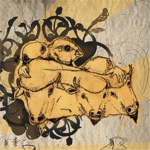|
|
 |
Dusted Reviews
Artist: Phosphorescent Album: The Weight of Flight Label: Warm Review date: Nov. 2, 2004 |

|
|
|
 |
Phosphorescent, from Athens, Georgia, consists of Matthew Houck and assorted collaborators. The Weight of Flight EP is their second release, coming after last year’s full-length A Hundred Times or More, and it continues in that album’s neo-folk vein. Phosphorescent’s first album and a self-released solo disc have already earned Houck giddy comparisons to Bob Dylan from the typically breathless English music press, and so the bar has been set fairly high. Whether The Weight of Flight can hold the attention of the notoriously fickle English weeklies is an open question, but it certainly deserves to. The EP nears disaster at times, principally by recalling a number of leading lights from American independent music, but it has its own vision, one that balances equal parts of Houck’s scratchy drawl and his bands’ fierce, noisy instrumentals. All in all, it is one of the strongest releases I’ve heard this year.
Things do not start well. The first song, “Toes Out to Sea,” sounds like a bad Will Oldham impression: a slow dirge, an off-key singer, delusions of introspection and revelation, and all without the Old Testament argot that Oldham deploys so deftly. It picks up from there, however. Houck probably isn’t a classically gifted singer: he sounds both adenoidal and gravelly. But – and this line comes from Kierkegaard’s Repetition, so it’s got to be credible – a good voice is not identical with good vocal cords. And Houck has a good voice. He has Willie Nelson’s habit of singing behind the beat, and consequently his accompanists seem to have the same sort of difficulty harmonizing with him, which leads to some nice, ramshackle choruses. He also has Jeff Mangum’s penchant for bombast and wordless histrionics. Which doesn’t necessarily mean that he sounds like Jeff Mangum, Willie Nelson, or even Will Oldham (although throwing out those three names would just about triangulate it). Rather, I mean that he’s an effective singer in the same way that Nelson, Mangum, and Oldham are – that he stretches his impossibly scratchy voice as far as it’ll go, and that he flails for notes and grasps them more often than not, and this struggle actually sounds good.
“All of it, All” offers the best example. Opening in front of some ominous percussion and an organ and guitar playing a pair of subdued riffs, it’s Houck’s show initially. The lyrics dutifully avoid any kind of specificity and are really just a half-dozen ways to describe struggle (e.g. “those who love you must die, yes and more than one time”). Kind of blasé for a few minutes, actually, but as the vocals build the arrangement matches them; the organ and guitar give way to distortion and a set of backup singers try to match Houck’s unglued howl, which sells the song.
“When We Fall” is a stomping, self-conscious country sing-along, right down to the too-precious lyrics. Nobody could claim with a straight face that “the sky tonight at sundown looked like God himself, feeding diamonds to his horses made of gold,” unless that person is trying to make the next line – “and the secret here, you know, is that I love you so, but I don’t want your heart to know” – sound equally ridiculous. If the idea amounts to the cliché that love makes fools of us all, award bonus points for at least saying so in a novel way.
“Mrs. Juliette Low,” the final song and perhaps the best, starts with an organ drone somewhere between a sound installation and church music, over which Houck’s voice breaks a half-dozen times during the course of three minutes. It’s what so much of this neo-Appalachia isn’t: easily placed side-by-side with contemporary music, free of any hint of cultural exploitation, and – most crucially – unforced. It may not keep the British interested until the next album, but I’ll keep listening.
By Tom Zimpleman
|







